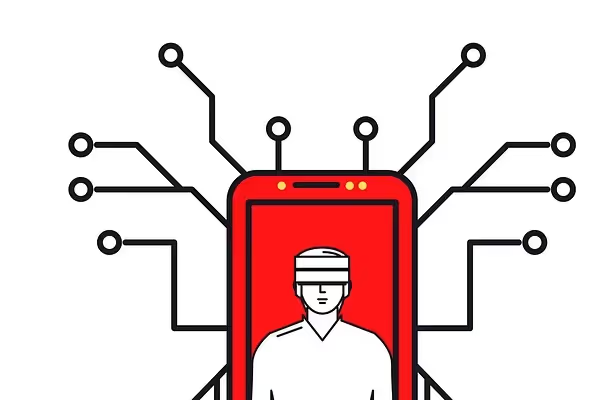Digital transformation has reshaped nearly every aspect of how we evaluate trust, character, and suitability, whether in job candidates, volunteers, or tenants. Today, decision-makers have access to more than resumes and interviews. Social media behavior, digital content, and online footprints are becoming essential layers of identity assessment.
Enter AI in social media background screening, a powerful new approach that helps organizations make smarter, faster, and more equitable decisions. With the growing volume of digital data and the limitations of manual screening, AI offers scalable solutions to vet candidates responsibly and efficiently.
Digital Footprints: The New Resume
In an era where nearly everyone has some online presence, cyber vetting is becoming an integral part of background checks. Social media accounts often reveal more than a CV can, including values, communication style, public behavior, and even red flags that could impact professional settings.
Social media platforms such as Twitter, LinkedIn, Instagram, Reddit, and Facebook offer a window into a candidate’s personality, professionalism, and alignment with company culture. Recruiters are increasingly turning to these platforms to evaluate potential hires before making critical decisions.
For instance, patterns in a person's tweets could hint at leadership qualities or signal problematic behavior. While this opens up valuable insights, it also raises concerns about subjectivity, bias, and ethics, which AI background screening aims to solve.
📖 Read More: Why Social Media Screening Matters More Than Ever in 2025
What Is AI-Powered Social Media Screening?
With millions of posts, comments, and interactions taking place every minute online, manual review is no longer feasible. This is where AI-powered vetting tools come into play.
These tools use technologies like machine learning, natural language processing (NLP), and sentiment analysis to scan and interpret public digital behavior. AI can understand context, identify tone, detect inappropriate language, and even flag potential risks such as:
- Hate speech
- Bullying or harassment
- Substance abuse references
- Violence or aggression
- Discriminatory content
- Fraud or ethical breaches
- Industry-specific risks
- Positive indicators like activism, leadership, or social impact
Unlike basic keyword matching, AI tools analyze the context around a phrase, helping organizations avoid false positives. For example, someone sarcastically quoting a controversial statement would be flagged by simple filters, but AI can often detect the nuance.
🔗 Explore More: Social Screening Tools by GetPhyllo
How AI Vetting Tools Streamline Background Checks?
Manual background checks are time-consuming, prone to human error, and often inconsistent. AI vetting tools change this equation by offering automated, standardized, and legally compliant background screening workflows.
AI tools integrate with HR and compliance systems to analyze:
- Social media behavior
- Blog posts
- Forums and comment sections
- Publicly available digital content
- Metadata and behavioral patterns
These insights support various types of screening, including:
- Employee background checks
- Freelancer and gig worker vetting
- Volunteer screening for nonprofits and schools
- Tenant screening for landlords and leasing agents
- Admissions checks in higher education
Automated systems can screen hundreds of profiles per hour, something no human team could match, making them essential for fast-paced industries.
🔗 Learn More: Background Verification Solutions
📖 Read More: What Does A Background Check Show And Include
Why Automated Background Checks Are the Future
Organizations are increasingly adopting automated background checks not just for efficiency but also for fairness, consistency, and improved candidate experiences. With the rise of AI vetting tools, the traditional approach to background screening is being replaced by more dynamic and scalable systems.
Here are some of the top benefits of using AI-powered background screening:
Speed and Scalability
AI tools reduce the screening time from days to hours. This is especially useful for companies with high applicant volumes or fast-moving hiring cycles, where delays in decision-making can result in lost talent or operational bottlenecks.
Standardization and Fairness
Every candidate is evaluated against the same set of criteria, which significantly lowers the risk of unconscious bias in the review process. By eliminating inconsistent human judgment, AI fosters a more objective and equitable vetting experience.
Lower Costs
AI eliminates the need for large background screening teams and reduces administrative costs while maintaining or even improving quality. Automated systems streamline workflows, cut down manual tasks, and free up HR teams to focus on more strategic initiatives.
Risk Reduction
Early identification of problematic digital behavior reduces the chances of reputational damage, lawsuits, or security threats post-hiring. AI can flag potential red flags before a hiring decision is finalized, enabling better-informed choices and long-term workforce stability.
📖 Read More: How Social Media Screening Tools Can Help in Reducing Hiring Bias
Real-World Use Cases of AI Background Screening
The applications for online vetting software powered by AI are diverse and expanding.
Recruitment and Talent Acquisition
Companies use social media analysis to assess alignment with company values and culture, beyond technical skill sets. This is especially important for leadership roles, customer-facing positions, and public representatives.
Volunteer and Youth Organization Vetting
Nonprofits and schools use AI vetting to ensure that staff and volunteers working with vulnerable populations have no digital history of harmful behavior.
📖 Read More: What Do Schools Look For In Volunteer And Employee Background Checks
Tenant Screening
Landlords can use digital behavior analytics to assess tenant reliability, especially in high-value property markets where trust is critical.
Gig Economy Platforms
Companies like Uber, TaskRabbit, or Airbnb use AI background screening to build community trust and reduce incidents by evaluating user-generated content and user behavior history.
Addressing Ethical and Legal Concerns in Cyber Vetting
With the power of AI comes responsibility. Ethical questions around cyber vetting and social media background checks are more relevant than ever.
What counts as “public” content? Are candidates aware they’re being screened this way? What if a candidate is flagged unfairly?
To remain ethical and compliant, organizations must:
- Obtain clear consent before performing social media checks
- Focus only on relevant and public content
- Use explainable AI models that can justify flagged content
- Provide appeals or dispute processes
- Follow global standards like GDPR, CCPA, and FCRA
As regulations evolve, companies using AI vetting tools must stay ahead of legal trends to ensure they’re not only effective but also responsible.
Challenges in AI-Driven Background Screening
While the promise of AI background screening is strong, challenges still exist. It’s important for organizations to be aware of these limitations and mitigate risks through thoughtful implementation.
Contextual Misunderstanding
AI can misinterpret jokes, sarcasm, or artistic expression, leading to unfair flags. Even advanced natural language processing systems may struggle with understanding tone or cultural nuances, which can result in false positives during screening.
Data Privacy
Using personal data without proper consent can result in legal and reputational consequences. Compliance with regulations such as GDPR, CCPA, and other regional privacy laws is essential. AI tools should only analyze public information and must respect boundaries around personal digital content.
Bias in Algorithms
If trained on biased datasets, AI tools can replicate existing prejudices, undermining fairness. This includes racial, gender, or cultural biases that might influence how certain language or behavior is flagged. Responsible AI design requires continuous evaluation and retraining to ensure fairness and inclusivity.
Candidate Distrust
Some candidates may feel uncomfortable being evaluated by machines. This discomfort can lead to distrust in the hiring process or withdrawal from opportunities. Transparency and communication are essential to build trust in the process. Organizations should clearly explain what is being screened, how AI is used, and how decisions are made.
Combining human oversight with AI, a "human-in-the-loop" approach, is often the best way to balance speed with ethics.
The Road Ahead: AI and the Future of Vetting
As AI continues to evolve, so too will the capabilities of online vetting software. Future developments include:
- Industry-specific AI filters tailored for healthcare, finance, education, etc.
- Multilingual vetting engines for global talent acquisition
- Behavioral analytics to assess emotional tone, communication trends, and leadership traits
- Continuous monitoring for sensitive roles like pilots and financial advisors
- Deeper integration with HR tools, ATS platforms, and compliance dashboards
Ultimately, AI will not replace human judgment but will significantly enhance it.
Final Thoughts
The future of background checks is automated, intelligent, and ethical. By leveraging AI vetting tools for social media screening, organizations can gain deeper insights, make faster decisions, and reduce bias in ways traditional methods cannot.
But the key lies in implementation. The most successful companies will be those who combine AI’s power with ethical design, human empathy, and legal transparency.
To explore how you can integrate AI-powered digital vetting into your organization, visit Phyllo's Social Screening Platform.
Frequently Asked Questions (FAQs)
1. What is AI background screening and how does it work?
AI background screening uses algorithms and machine learning to analyze publicly available digital content, especially from social media, to evaluate an individual’s behavior, communication patterns, and potential red flags. These systems use natural language processing (NLP) and sentiment analysis to interpret context and tone, offering more nuanced evaluations than traditional checks.
2. Is social media screening legal and ethical?
Yes, but it must comply with regulations such as GDPR, CCPA, and FCRA. Ethical social screening requires candidate consent, transparency, and a focus only on relevant public information. AI tools should also be explainable, and candidates must be allowed to challenge or correct results if necessary.
3. What kind of red flags can AI vetting tools detect?
AI tools can detect signs of racism, hate speech, sexism, cyberbullying, drug references, threats of violence, and other behavior deemed inappropriate or unsafe in professional environments. They can also highlight positive behaviors such as community involvement or leadership.
4. Can AI-powered checks replace traditional background verification?
AI can significantly enhance traditional background checks by adding depth, speed, and consistency. However, it should be seen as a complement, not a complete replacement, for criminal record checks, identity verification, and reference calls.
5. Are AI tools biased?
AI is only as good as the data it's trained on. If historical datasets contain biases, the AI can reflect them. This is why ethical AI development and continuous training on diverse datasets are critical.
6. How do I know if a candidate has been unfairly flagged?
Use AI platforms that offer transparency and context for each flag. A strong vetting tool should provide clear explanations, examples of flagged content, and the ability for human reviewers to assess whether the content truly poses a risk.
7. What are best practices for using online vetting software?
Best practices for using online vetting software include obtaining clear and explicit consent from candidates before initiating any screening. It’s essential to limit the review to publicly available and relevant information to avoid privacy violations. The use of explainable AI helps ensure that any flagged content can be understood and reviewed fairly. Including human reviewers in the process allows for context-based evaluation in sensitive cases. Finally, staying updated on evolving legal and compliance regulations is critical for responsible use.
8. Which industries benefit most from AI background screening?
Industries with high compliance or trust standards like finance, healthcare, education, and tech benefit most. However, virtually all industries can benefit from faster, fairer, and more informed hiring decisions.










.avif)



